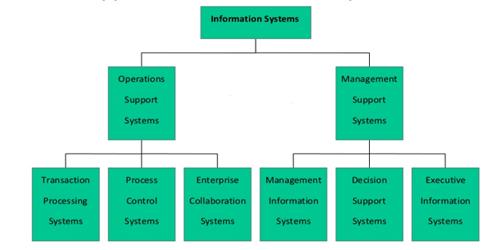An information system can be defined as a set of the coordinated network of components. which act together towards producing, distributing and or processing information. An important characteristic of computer-based information systems information is precision, which may not apply to other types. So, the purpose of an information system is to turn raw data into useful information that can be used for decision making in an organization.
Various types of information system (IS): An information system in today’s business world can be classified by the following way –

Figure: Various types of information system (IS)
(A) Operating support system (OSS): Operating support system produces a variety of information products for internal and external use. The role of a business is to –
(i) Efficiency process business transaction;
(ii) Control industrial process.
(1) Transaction processing system (TPS): transaction processing system record and process data, resulting from business transaction. The process transaction in basic ways. In batch processing, transaction data are accumulated over a period of time and processed periodically.
(2) Process control system (PCS): Process control system monitors and control physical process. For example, petroleum refineries and the assembly lines of automated factories such systems.
(3) Enterprise collaboration system (ECS): Enterprise collaboration system enhance team and workgroup communication and productivity and include communication application data, that are sometimes called an office automation system. For example, workers in a projecting may use a video conference to hold an electronic meeting to coordinate activities.
(B) Management support system (MSS): Management support system provides information and support for decision making by all types of managers and business professional is a complex task.
(1) Management information system (MIS): Management information system provides information in the form of reports and display to managers and many businesses professional. For example, Sales managers may use their network computers and web browsers to get instantaneous displace about the sales, results of their products.
(2) Decision support system (DSS): Decision support system gives direct computer support to managers during the decision making process. For example, an advertising manager may use a Decision Support System (DSS) to perform a what; if analysis as part of a decision to determine where to spend advertising dollars.
(3) Execution information system (EIS): Execution information system provides critical information from critical information from a wide variety of an internal and external system in easy to use displays to executives and managers.
















